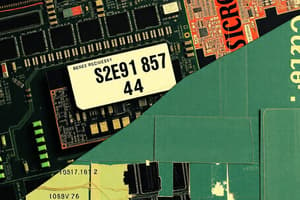Podcast
Questions and Answers
What should be considered for selecting computer hardware and software?
What should be considered for selecting computer hardware and software?
- Functionality, cost, speed, and aesthetics (correct)
- Warranty length
- Location of purchase
- Brand reputation only
Why are SSDs generally preferred over HDDs?
Why are SSDs generally preferred over HDDs?
- HDDs offer faster data access speeds
- SSDs can be easily replaced
- HDDs have lower costs and higher capacity
- SSDs are more durable due to having no moving parts (correct)
What does the speed of a computer primarily depend on?
What does the speed of a computer primarily depend on?
- Processor, RAM, and storage type (correct)
- Brand of the operating system
- Size of the computer monitor
- The color of the computer casing
How should one approach budgeting for computer components?
How should one approach budgeting for computer components?
Which of the following software types might a digital artist require?
Which of the following software types might a digital artist require?
How does the performance of software depend on its design?
How does the performance of software depend on its design?
What is a significant factor when considering the durability of hardware?
What is a significant factor when considering the durability of hardware?
Which statement best describes the cost of software options?
Which statement best describes the cost of software options?
What is the primary function of the Arithmetic Logic Unit (ALU)?
What is the primary function of the Arithmetic Logic Unit (ALU)?
Which of the following correctly describes primary storage in a computer?
Which of the following correctly describes primary storage in a computer?
What is the main difference between primary storage and secondary storage?
What is the main difference between primary storage and secondary storage?
What role does the Control Unit (CU) play in the processor?
What role does the Control Unit (CU) play in the processor?
Which type of memory is known for being volatile and losing all data when the power is turned off?
Which type of memory is known for being volatile and losing all data when the power is turned off?
Which storage device is typically faster in accessing data?
Which storage device is typically faster in accessing data?
What is a key advantage of having more RAM in a computer?
What is a key advantage of having more RAM in a computer?
Which of the following statements is true about secondary memory?
Which of the following statements is true about secondary memory?
Flashcards
CPU (Central Processing Unit)
CPU (Central Processing Unit)
The computer's brain, interpreting and executing instructions from hardware and software to process input data into output.
ALU (Arithmetic Logic Unit)
ALU (Arithmetic Logic Unit)
The part of the CPU that performs mathematical and logical operations.
Control Unit (CU)
Control Unit (CU)
Part of the CPU directing the processor by reading, interpreting, and coordinating instructions from memory.
Primary Storage (RAM)
Primary Storage (RAM)
Signup and view all the flashcards
Secondary Storage
Secondary Storage
Signup and view all the flashcards
Hard Disk Drive (HDD)
Hard Disk Drive (HDD)
Signup and view all the flashcards
Solid State Drive (SSD)
Solid State Drive (SSD)
Signup and view all the flashcards
Volatile Memory
Volatile Memory
Signup and view all the flashcards
External Drives
External Drives
Signup and view all the flashcards
Computer Functionality
Computer Functionality
Signup and view all the flashcards
Cost of Computer Parts
Cost of Computer Parts
Signup and view all the flashcards
Computer Speed
Computer Speed
Signup and view all the flashcards
Hardware Speed
Hardware Speed
Signup and view all the flashcards
Software Speed
Software Speed
Signup and view all the flashcards
Hardware Durability
Hardware Durability
Signup and view all the flashcards
Software Durability
Software Durability
Signup and view all the flashcards
Study Notes
Computer Components and Systems
-
Processor (CPU): The "brain" of the computer; it interprets and executes instructions from hardware and software, receiving input, processing it, and providing output.
-
Arithmetic Logic Unit (ALU): Performs mathematical and logical operations (addition, subtraction, comparisons).
-
Control Unit (CU): Reads and interprets instructions, manages data flow, and coordinates other parts to ensure tasks are executed correctly.
-
Memory (RAM): The computer's immediate memory, holding data the processor is actively using. It is volatile (data lost when the computer turns off). More RAM allows for better multitasking.
-
Storage (Secondary Memory): Long-term data storage, retaining information even when the computer is off. Includes:
- Hard Disk Drives (HDDs): Traditional storage with spinning disks; cost-effective but slower.
- Solid State Drives (SSDs): Faster and more reliable than HDDs, using flash memory; more expensive but faster.
- External Drives: HDD or SSD connected externally, useful for backups and file transfers.
- Memory Cards/USB Drives: Compact for moving and sharing files.
Hardware and Software Selection
-
Functionality: Consider the tasks you need to perform to select appropriate hardware and software. Gamers need powerful processors and graphics cards; graphic designers need high-resolution screens and design programs.
-
Cost: Set a budget. High-end hardware (like new processors) and some software can be expensive.
- Hardware cost variations: Prices differ significantly between components. Top-tier parts are more expensive but offer more performance.
-
Speed: Important for how quickly the computer starts up, loads programs, and processes tasks. Speed is tied to the processor, RAM, and storage type. SSDs are significantly faster than HDDs.
- Software speed considerations: Software can vary in speed based on its programming and resource demands. Some software performs well on less powerful computers; others require more power.
-
Durability: Quality hardware and well-maintained software ensures reliable performance over time. SSDs are more durable than HDDs due to no moving parts.
Studying That Suits You
Use AI to generate personalized quizzes and flashcards to suit your learning preferences.




